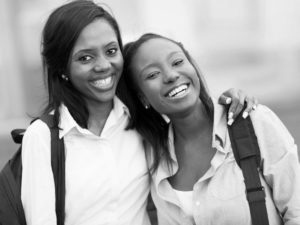From Your Minister
February 1, 2017Podcast: Download (Duration: 6:02 — 3.0MB)
Subscribe: More
 I’ve always thought that God the Father had a really sick relationship with Mother Earth. I mean, here’s the earth, thought of traditionally as female. She is giving us 100% of what we need to be alive—food, water, air, a nice blend of moon and sun, everything. Our very bodies.
I’ve always thought that God the Father had a really sick relationship with Mother Earth. I mean, here’s the earth, thought of traditionally as female. She is giving us 100% of what we need to be alive—food, water, air, a nice blend of moon and sun, everything. Our very bodies.
And then there’s God the Father—invisible, a deadbeat dad really. And we are supposed to dedicate all of our gratitude and our praise to Him. We are free to treat Mom any way we like—she’s always there, not interesting or important. But Dad—we must treat him with reverence.
Seriously, no one I know, starting with me, believes that. But those ancient patriarchal myths are there in all of us, consciously or unconsciously, swirling around in our psyches. And they are echoed in how we think about our bodies and our souls. Our bodies, like the earth, are always there. We can treat them however we want. Nothing sacred about them.
Our souls, invisible and elusive—now those are important. Religions focus on saving them, or growing them, or bringing them together. We have UU congregations called “All Souls,” but never any I’ve known about called “All Bodies.”
But my body matters as I walk around in it—as an overweight white woman, perceived by many to be uninteresting but by virtually no one to be dangerous. However much I might wish to be able to do so, I can’t lend my body to a young Black man and say, here, take this for a day or two so you might have some rest from the violence coming at you ceaselessly. No body-swapping possible.
We’ve got the bodies we’ve got, and it’s only by living as those bodies that we grow our souls. Living in my particular body has taught me particular ways to interact, to speak, to think. (Of course, many other factors besides race and gender are relevant as well—age, nationality, income, family history, education, ability, and so many others.)
So our bodysouls grow, and struggle, and experience joy, and new younger bodysouls emerge, and old bodysouls die. And we know that the invisible is real—that the ancestors are with us and the unborn call out for us to imagine them—but we also know that it is in living bodies, here and now, where life takes place.
I am sitting here in a specific body writing this, as you are in a specific body now reading it. My words are abstractions that can be argued about, but my breath and yours are concrete necessities if these words are to be shared. Our lungs mostly function without effort from our minds, so it can be easy to dismiss them as dull, unworthy of notice. But the moment someone’s lungs, or heart, or brain cease functioning nothing else matters.
The moments when we are at the edges of life—when a new baby is being born, or someone is dying—we see the interconnectedness of it all clearly on the edgeless edge, and we see how completely body and soul are one. Anyone who has seen the dead body of a loved one knows that it is, so quickly, not our loved one anymore. The absence of the breath, the spirit that infuses it with life, renders it a shell, empty.
All of this is critical in our community that does not physically gather, where people identify through reading this newsletter, or by joining us online with photos or words or video, or by dropping us a line. Though our bodies are not in the same place, we are connected to one another as bodies. It is important that some of our bodies are older; and some of us are sick, struggling with pain; and some of us are incarcerated, without freedom for self-determination; and some of us are able-bodied while some of us have limited mobility or ability. Our bodies matter. Every single one of them.
So if I were to invent a new religion, perhaps it would be dedicated not to saving souls but to saving bodies. Black bodies. Poor bodies. Children’s bodies. Queer bodies. Transgender bodies. Sick bodies. Bodies of varied ability and mobility. Saving bodies not by forcing them into some tiny cookie cutter definition of what is good and what is bad, not by trying to make them conform to some abstract idea of salvation, but by providing what is needed for every single person with every single body to know themselves beloved on this earth.
And maybe I don’t have to invent a new religion. Maybe that’s what we’re all doing here together, in this far-flung body of a Unitarian Universalist congregation, allowing people to be exactly where they are and who they are. Maybe we’re honoring the unique location of each person in their very particular body, here in the Church of All Bodies.
- From Your Minister - July 1, 2020
- From Your Minister - June 1, 2020
- From Your Minister - May 1, 2020
Quest Monthly Print Edition
Recent Issues
Latest Spiritual Reflection Posts
Weekly Newsletter
About
Quest for Meaning is a program of the Church of the Larger Fellowship (CLF).
As a Unitarian Universalist congregation with no geographical boundary, the CLF creates global spiritual community, rooted in profound love, which cultivates wonder, imagination, and the courage to act.
Contact
Church of the Larger Fellowship Unitarian Universalist (CLFUU)
24 Farnsworth Street
Boston MA 02210

